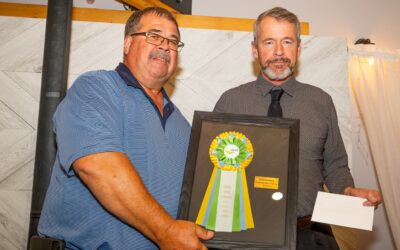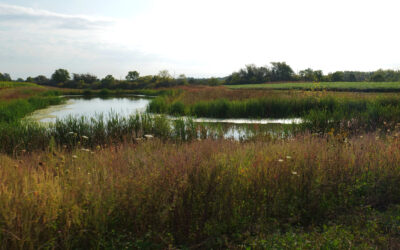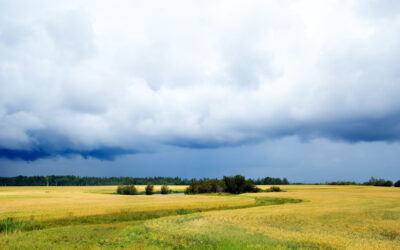ALUS Middlesex receives funding from Wildlife Habitat Canada to add more wetland habitat to the landscape through farmer-led stewardship.

Wetland restoration work underway on a farm near Mount Brydges, ON. This wetland was completed in partnership with St. Clair Conservation Authority.
In 2022, ALUS Middlesex partnered with Wildlife Habitat Canada to fund farmer-led projects that add wetlands and upland habitat to the landscape. Through the Habitat Conservation Stamp Initiative grant, ALUS Middlesex received $35,000 in funding to help support the habitat needs of migratory birds and waterfowl.
Canada’s diverse landscapes support a great abundance and variety of birds. More than 450 native bird species regularly make use of Canada’s lands and waters. Located in the Great Lakes region, Middlesex County is an important area for migratory birds, as it is home to two migratory bird trajectories: the Atlantic and the Mississippi flyways. Over 40% of all North American migrating waterfowl and shorebirds use these routes. With all the natural biological diversity in the area, Middlesex County is a hub for local and migratory wildlife.
Each spring, the skies of the county are filled with the sights and sounds of millions of birds arriving from their southern wintering grounds. Some bird species travel over 20,000 kilometres. During their journeys, these birds rely on critical wetland and upland habitat to serve as breeding, migration and staging grounds. Unfortunately, migratory and shorebird populations have been declining in Canada since the 1970s, with shorebird and grassland bird populations suffering a decline of over 40%.

Wetlands are important habitat for migratory birds, like the great blue heron, providing a source of food and shelter. Photo Credit: Andrew Patrick.
To help provide habitat and support the recovery of bird species, ALUS Middlesex used the funding from WHC to increase the availability of water features and suitable waterfowl habitat. This was achieved through the creation and restoration of wetlands and upland habitats on marginal farmland. ALUS Middlesex worked with 25 different farmers to establish 5 acres of wetland and 50 acres of upland habitat. The restored wetland sites will improve feature connectivity in the County, while also serving as resting and staging grounds for waterfowl and migratory birds.

Restored wetlands on the agricultural landscape help to provide habitat for wildlife and offer other services like water filtration.
This project was made possible by the Habitat Conservation Stamp Initiative, which is funded by the proceeds received from the Canadian Wildlife Habitat Conservation Stamp. Funds raised from the sale of the stamp go to the Habitat Conservation Stamp Initiative program, which is managed by Wildlife Habitat Canada (WHC). WHC is a national non-profit, charitable conservation organization that was established in 1984. WHC’s objectives are to provide funding for wildlife habitat conservation in Canada, to conserve, restore and enhance wildlife habitat and to foster coordination and leadership in the conservation community. The funds from the Canadian Wildlife Habitat Conservation Stamp specifically support projects that include waterfowl, migratory birds and their habitats. Over $62 million has been raised through the sale of the stamp, which includes the stamp-collecting products, the fine art products, and the stamp affixed to the Migratory Game Bird Hunting Permit. This revenue has funded more than 1,600 projects across Canada, including habitat conservation, restoration, stewardship initiatives and educational programs.
ALUS Middlesex acknowledges the generous support from Wildlife Habitat Canada for funds needed to implement key creation of Migratory Bird Habitat projects in Middlesex County. The staff and Partnership Advisory Committee of ALUS Middlesex would also like to thank all the wonderful farmer participants and other program partners for making this important project happen.



